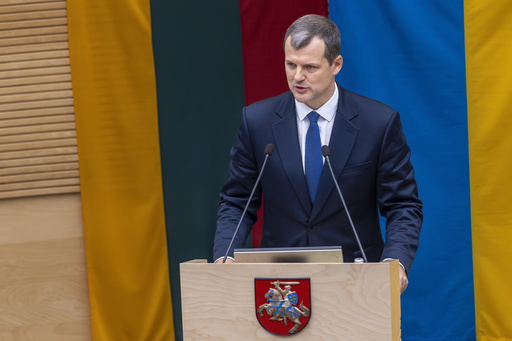VILNIUS, Lithuania — On Thursday, Lithuanian Prime Minister Gintautas Paluckas announced his resignation amidst ongoing investigations into his business practices, which have sparked public protests demanding he step down.
Paluckas, who became the head of the center-left Social Democrats late last year, took on the prime ministerial role after a coalition was formed by three parties following the parliamentary elections held last October in Lithuania. This decision could result in the dissolution of his entire Cabinet, potentially leaving the nation without a functional government just weeks before Russia is scheduled to conduct joint military exercises with the neighboring country of Belarus.
In a letter addressed to the members of the Social Democratic party, Paluckas explained that the ongoing scandals were impeding the government’s work and opted not to allow the ruling coalition and the Cabinet to become ensnared by these controversies. “I choose not to cling to any position and am open to various scenarios and outcomes,” he stated.
His resignation was publicly confirmed by President Gitanas Naus?da on Thursday morning. Despite the political turmoil, Lithuania’s foreign policy stance is anticipated to remain consistent. President Naus?da, who was elected separately, remains the prominent representative of Lithuania in international matters and is a steadfast ally of Ukraine in its struggle against the invading Russian military forces.
Paluckas has been under scrutiny due to media inquiries into his professional and financial dealings. A series of investigations were published in July that shed light on various allegations regarding his past and current business activities, prompting anti-corruption entities and law enforcement agencies to launch their own investigations.
A significant damage to Paluckas’ reputation came when it was revealed by media outlets that he failed to settle a considerable portion of a 16,500-euro fine, stemming from a 2012 criminal case known as the “rat poison scandal.” In that instance, Paluckas was found guilty of improperly managing the bidding process for rat extermination services in Vilnius while serving as the city’s municipality administration director. In 2012, Lithuania’s highest court concluded that he unlawfully granted advantages to the firm that presented the costliest bid.
While Paluckas’ sentence included a two-year prison term, it was ultimately suspended for one year, and he never served time in jail. Despite resigning, he maintained that his business operations were legitimate and claimed that the critiques were the result of a “coordinated attack” orchestrated by political rivals.
By stepping down, Paluckas avoided the possibility of formal impeachment proceedings from the opposition. Talks to form a new coalition government are expected to commence soon to determine the new Cabinet.


